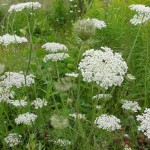

 Queen Anne’s Lace (QAL) aka Daucus Carrota aka Wild Carrot
Queen Anne’s Lace (QAL) aka Daucus Carrota aka Wild Carrot
After going off the Pill back in 2003, I tried out all sorts of traditional birth control methods, none of which I liked. While doing research for a pen & ink piece regarding the origins of the shape of the heart, I discovered a theory that the shape comes from the seed of a now extinct plant whose claim to fame in antiquity was it’s contraceptive properties. This is where I first encountered the concept of a plant preventing conception, as well as what led me to Sister Zeus’ site (http://www.sisterzeus.com), which contains a plethora of information about Synergistic Fertility Management.
Before you mess with any kind of experimental substance not approved by the FDA and on which there haven’t been broadly sampled clinical trials, you need to do your research, and decide whether or not you are prepared for a certain level of self-experiementation. Holistic health and fertility management are not about quantifiable success rates, or being lazy, or getting a quick fix before running poff to work. That’s what Big Pharma is for. Robin Rose Bennett is considered the foremost expert, so if you are interested in using QAL, you should read her article: http://robinrosebennett.com/wild_carrot%20article.htm.
How it Works
Queen Anne’s Lace works by rendering the uterine environment inhospitable to a pregnancy, thus inhibiting implantation of a fertilized ovum. So while it’s possible for fertilization to occur, and you may even feel subtle cramps resulting from the zygote attempting to implant in the uterine wall, QAL if taken correctly should result in your normal monthly menstruation. The tricky thing with birth control in general is that it varies greatly from woman to woman. So while one method, be it the Pill, IUD or an herb might work great for one person, and not at all for another. Some may have side effects, others not. Even the concentration in the herb itself can vary depending on factors of harvesting, preparation, environment, climate, and so on.
So if you’ve gotten this far, after all my quid-pro-quoing, let’s get started with some instructions I received when I first ordered QAL ( Penny’s Herb Co. More recently I’ve been buying it at Flower Power where I do my usual herb shopping, and where the ladies have a plethora of wonderful knowledge and conversation as well.)
option 1. Chew approx. 1 teaspoon of seeds thoroughly each day
option 2. Chew approx. 1 teaspoon of seeds thoroughly for 3-4 days before ovulation, during ovulation, and for 3 days after ovulation.
option 3. Chew approx. 1 teaspoon of seeds thoroughly for 5-7 days after any unprotected sexual intercourse.
option 4. Ingest 15 drops of wild carrot seed tincture in hot water in any of the three ways listed above.
How *I* take it now, is a bit different, and after more than one unwanted pregnancy, this is what I feel is most foolproof:
Chew approx. 1 teaspoon of seeds thoroughly each day from the end of menstrual flow, up to the first day of your next menstrual period. I consider my period a safe, infertile time, and prefer to take a break from sexual activity in favor of introspection and self-pampering, so I stop taking the seeds when bleeding. I start up again when sexually active. However, I am informed by my healer/RPA that this is often where many women mistakenly get pregnant – one CAN be fertile in the middle of one’s cycle, cine ovulation can occur anywhere from 10-14 days after the first day of your cycle. I’ve read that certain hormone-rich foods such as yams can also induce hyper-ovulation.
Why QAL totally rocks my world
What I always hated about the Pill was the All-or-Nothing nature of it. (If you don’t already know, being on the Pill means taking it continuously, and in the beginning you’ll have to wait 1 month before you’re protected). So when you get involved with a guy, you start questioning. “Is he worth the hassle? Or the cost if my health plan doesn’t pay for it? Am I even gonna be into him 3 months from now?” If you decide to go off it, you’re unprotected save for condoms (which we all know can break or slip off), so you feel like you have to be nervous and cautious about who you’re fooling around with — god forbid you find yourself carrying the spawn of some fling from your last Brazilian vacation. With QAL, you take it as needed. Too busy for sex this month? Leave it in the cabinet, it’ll keep. Have you and your lover just gotten tested and are ready to pound each other into the mattress sans condom? Then go for it, right here, right now, on the kitchen floor, and take a teaspoon each day until your next period. If the condom breaks, if you’re in that yes-we’re-together/no-we-aren’t/we-can’t-decide-if-we’re-breaking-up limbo, if you or your boy-toy decide to go on sabbatical, observe Ramadan, or sublimate your Svadhisthana energy for a spell, QAL bends to your rhythms. Sometimes I wonder if the lack of adequate birth control is the root of the reason women are so obsessed with seeking out ‘committed’ relationships instead of self-exploration in love’s varied forms.
Oh yeah, and if you don’t want to pay for it (It costs me about $30 for 8 ounces from Flower Power[url], or about $10 a month), it’s growing for free, fields of it, and can be harvested for seeds in the fall. If you’re going to do this, obviously you should study up on herbology and/or hire an expert to help you identify it. There are poisonous plants as well as ineffective ones that look similar and you absolutely need to ensure you are collecting the correct herb.
Yeah but how do you know it actually works??
I have experienced a total of three unwanted pregnancies in my life, so I am quite sure that I am quite fertile. When I first started using the QAL, I had little way of knowing it would actually work, but decided, when I had the opportunity with a lover with whom I was fluid-bounded, to test it out by going the full monty during my fertile week. We hadn’t discussed birth control and as far as he knew, I was still on the Pill. I didn’t tell him about it and I’m not sure what I would have done had I ended up pregnant by him. I don’t think I would recommend this way — it’s always nicer to know your lover is onboard should an unplanned pregnancy occur. Which brings up another important point — that if your’e going to venture into this realm, you need to think about what you will do if you should accidentally get pregnant. I was quite prepared to follow up with a clinical abortion, and this is the recommendation of most herbalists whenever one has used herbs to interfere with the progression of a preganancy, due to the unknown long-term effects of such interruption.
So I decided I had to KNOW then and there, and folowing our throws of passion, I took the Queen Anne’s Lace until the end of the month, and was overjoyed upon seeing the first blood of my next period. This is how I decided to trust it as my sole form of birth control when with lovers that I know and trust enough to have unprotected sex with.
This was in 2004. Since then, I have experienced 2 unwanted pregnancies, which I fully realize undermines my championing of the herb as a contraceptive – but hear me out. I take responsibility for both pregnancies and do not consider it a mark against the efficacy of the herb; In the first instance, I stopped taking it too soon after my last tryst. I still don’t know if I simply miscalculated ovulation, ovulated late, or ovulated twice that month, but I ended up going to my current women’s health practitioner for the abortion pill. The second time it happened it was nary a few months after the first, and I was simply so busy on a project at work demanding late nights and early mornings that there were a couple of days i forgot to take it. This is why I use my current method, outlined above, as opposed to basing dosage on when I believe ovulation occurs. I imagine knowing one’s cycle was near effortless way back when one menstruated in sync with all the other women in tribe, but times change and travel, stress, dietary changes and a litany of other aspects of modernity muddle the formula. This poses another problem in general with holistic methods in the modern age – they were usually developed during more leisurely times, through the experience of many in one’s community, and by our relationship with the wild. What a contrast to now, when they more often appear a counter-culture side-note to the hustle-bustle of our disconnected modernity.
*One popular theory is that the shape is actually that of a Sylphium seed, the contraceptive of choice in the ancient Greek city-state of Cyrene. I disagree with this, and believe the shape to be derived from that of a woman’s vulva, but which retained the more generalized word for one’s center & core. Here is a photo of the piece Key to My Heart; Semiotic Divergence & Transference